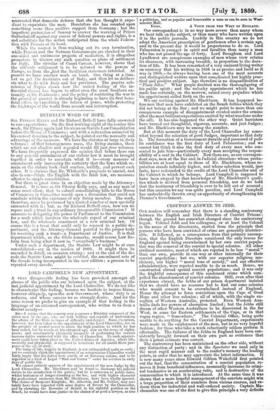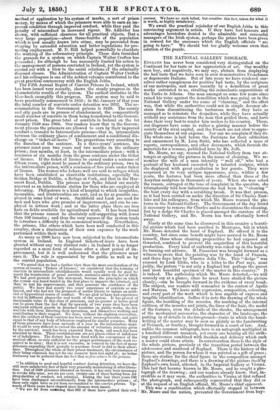CROFTON'S ANSWER TO JEBB.
OUR readers will remember that there is a standing controversy between the English and. Irish Directors of Convict Prisons ; though the ground has somewhat changed since the controversy, began. Colonel Jebb and his colleagues, or at least the Colonel in the name of the directorate, started from the principle that persons who have been convicted of crime are generally irretriev- able. It followed, as a consequence from that primary assump- tion, that the English Directors considered the only rescue for England against being overwhelmed by her own convict popula- tion was the removal of the convict to special colonies. Al other civilized countries, most of which are reputed to be less " moral " than our own, provide in one way or other internally for their convict population ; but we, with our superior religious ma- chinery, our higher "moral tone of society," and our effective administration, were reputed unable to do as much. Hence, we constructed abroad special convict populations; and it was only the frightful consequence of this condensed crime which com- pelled the abandonment of convict colonies. Still, even after that. experience abroad, the Jebbs of our prison department insisted that we should have no resource but to find out some colonies who would consent to be overwhelmed instead of England. Hence the attempt to force convictism' upon the Cape of Good. Hope and other free colonies ; all of which, with the single ex- ception of Western Australia, protested. Even Western Aus- tralia finds her powers of absorption limited ; but the Jebbs still dream of other Western Australians to be discovered in the far West, in some far Eastern settlements of the Cape, or in that vague region, "Somewhere." The Colonial Office, being quite unable to do anything for the Convict Department, experiments were made in the employment of the men, but in no very hopeful fashion ; for those who take a work reluctantly seldom perform it effectually. The failures of the Jebbs in England. have been con- sistently brought forward on their own part as evidences that their a priori estimate was correct. The controversy has been maintained on the other side, 'without any distinction of party ; and in the Spectator we need only in the most rapid manner call to the reader's memory the leading points, in order that he may appreciate the latest information. It is now many years since Edward Gibbon Wakefield first pointed out the fact, that the concentration of a convict population re- moves it from beneficial influences, necessarily increases its crimi- nal tendencies in an accelerating ratio and is destructive of the communities to which it is introduced. At the same time it was shown that a more hopeful management of the convicts might win a large proportion of their numbers from vicious courses and re- deem them for industrial and well-ordered society. Captain Ma- chonochie was one of the first to give this principle a very definite
method of application by his system of marks, a sort of prison money, by means of which the prisoners were able to earn an im- proved condition through improved conduct, while they paid the penalty of misconduct in increased rigour. Mr. Adderley has shown with sufficient clearness for all practical objects, that a
very large proportion—about three-fourths of the population which is now usually drawn into crime, may be prevented from straying by extended education and better regulations for pro- moting employment. M. D. Hill helped powerfully to elucidate the working of the reformatory principle. These data furnished the grounds for a system on which Captain Walter Crofton has proceeded ; for although he has necessarily limited his action to the management of persons convicted in Ireland, yet the system is carried out with a view to the social relations of the criminally disposed classes. The Administration of Captain Walter Crofton and his colleagues is one of the noblest volumes contributed to the great practical controversy with the English Jebbs. The Fifth Annual Report of Convict Prisons in Ireland, which has been issued very recently, shows the steady progress in the characteristio results of the system. The earliest statistics in the blue-book exemplify this progress. The system may be said to have practically commenced in 1855; in the January of that year the total number of convicts under detention was 3932. The ac- commodation in the Government prisons is 3420. The county and city gaols are in process of abandonment, the comparatively small number of convicts in them being transferred, to the Govern- ment prison. The gross total of convicts in Ireland on the 1st January 1859 was 1806. Our readers know that in the Govern- ment prisons the prisoners are allowed to earn by their improved conduct a transfer to Intermediate prisons—that is, intermediate between the ordinary places of confinement and a conditional dis- charge on "ticket-of-leave." The proportions vary according to the duration of the sentence. In a three-years sentence, the prisoner must pass two years and two months in the ordinary prison ; four months, at least, in the intermediate prison ; with a remission of six months from the gross sentence under the ticket of licence. If the ticket of licence be earned under a sentence of fifteen years, eight must be passed in the ordinary prison, two in the intermediate prison, with a remission of five years under ticket of licence. The women who behave well are sent to refuges which have been established as charitable institutions, especially the Golden Bridge at Dublin, a Refuge at Cork, and that in the Har- court Road, 'Dublin. The prisons near Spike Island are mainly reserved as an intermediate station for those who are employed at labouring. Philipstown is a kind of hospital to which incapables, incurables, and irretrievables are sent, and as far as possible em- ployed in some kind of work. Smithfield and Lusk are used for men and boys who give promise of improvement, and can be em- ployed in artizan work--; and at the latter place there are iron huts on fields available for agricultural work. It has been found that the prisons cannot be absolutely self-supporting with fewer than 100 inmates ; and thus the very.success of the system tends to introduce a difficulty in its economical working. Nevertheless, the prisons, like others which have been well conducted in this country, show a diminution of their own expenses by the work performed within their walls.
As many as 2000 have now been subjected to the intermediate system in Ireland. In England tickets-of-leave have been granted without any very distinct rule ; in Ireland it is no longer regarded as a mere form of release after a short period of im- prisonment, but it is well understood that the prisoners must earn it. The rule is appreciated by the public as well as by the convict population.
"We stated that we had a further view than the mere amelioration of the system of issuing Tickets of Licence,' we considered that the training of convicts in intermediate establishments would equally work for good to- wards the termination of penal servitude sentences under the Act of 1853. We had good grounds for this statement, because the principles on which the system was based tended in the first place to improve the criminal, and then to test his improvement, and thus generate the confidence of the public. We have had nearly two years' experience of convicts so sen- tenced, and who had not the prospects of earlier liberty to induce an artifi- cial or hypocritical course of conduct. We are glad to have had experience to test in different phases the real worth of the system. It has proved of inestimable value to this class of prisoners, and no greater or better proof can be given than the fact that for upwards of two years they have been employed without guards in detached localities on public works, the few warders with them directing their operations, and themselves working and contributing to their support. We state, without the slightest reservation, that the conduct of these convicts has been most unexceptionable, and quite equal to that of any body of labourers employed for similar purposes. Many of these prisoners have been upwards of a year in the intermediate stage. It would be very difficult to exceed the amount of voluntary industry given
by the convicts ; much has been expected from them, and much has been accorded by them. These establishments are not places either of indolence or of indulgence. The dietary has been fixed with the concurrence of the medical officer, as only sufficient for the proper performance of the work re- quired to be done ; that it is not excessive, is evinced by the fact of many prisoners expending their gratuity to purchase bread to add to their allow- ance. Throufhout the whole of their prison treatment, the circumstance of their being cnminals has not for one moment been lost sight of; no better testimony can be prduced than the fact that sofa° return to the prisons.
•
"In addition to good and hopeful conduct during detention, we have the still more satisfactory fact of their very generally maintaining it after libera- tion. Out of 1000 prisoners liberated on licence, it has only been necessary to revoke fifty-nine, not six per cent, twenty-one of these having been for irregularities of conduct, not criminal. During the last three years 700 have been discharged unconditionally from the intermediate prisons; - of. these only eight have as yet been recommitted to the convict prisons. Up- wards of three years have elapsed since licences were issued.
"We are far from aasonaing that 692 of these have quitted their evil courses. We have no such belief, but consider this fact, taken for what it is worth, as highly satisfactory.
We await the practical rejoinder of our English Jebbs to this convincing argument in action. If they have had honours and advantages heretofore denied to the admirable and successful managers of the Irish system, perhaps the prizes have been given in reward for the successes which the English officials "are going to have." We should but too gladly welcome even that solution of the puzzle.



























 Previous page
Previous page